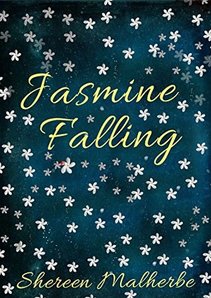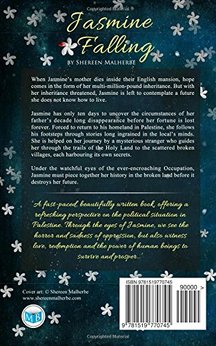|
by Rana Asfour Jasmine Elizabeth Nazheer has been bequeathed the sum of £7.6 million as well as the full ownership of her late mother’s British estate. However, Jasmine’s access to her inheritance is stalled when the solicitor announces that her mother had requested that the funds weren’t to be released until after Jasmine’s father countersigns. This is a major problem. Jasmine’s father, Ibrahim Nazheer, a Palestinian who had left them years before to return to his homeland, has been missing for nearly a decade and his daughter has no idea where to start looking for him. They had assumed he was dead ‘but the Israeli government had refused to issue a death certificate. Still, Jasmine's mother did her own burial in the ruins of the home they once shared. This part of the house, beneath the floorboards, became his resting place. The furniture, if uncovered, would reveal their life just as it was before he had gone'. As if that were not enough, Jasmine is further informed that she has ten days in which to determine the whereabouts of her father or whether he is, in fact, still alive, else the will expires and she is rendered penniless. Weighing her options and furious at her dead mother, Jasmine finally decides that her only solution lies in returning to Palestine to search for her father and get the matter resolved as quickly and painlessly as possible. Unearthing a trunk of her father’s belongings that had been delivered to the mansion by a young boy with an Arabic accent, several years after her father had last been seen, Jasmine tries to piece together the information she gleans from its contents trying to determine where her search is to begin. It is in the trunk that she finds a stack of letters, bound together with string and edged in a navy and white pattern, as well as newspaper articles, maps and missing person posters, from which her father’s face stares back at her. Armed with these letters, her father’s prayer beads and a long ago photograph of a hyena in its moment of rage ‘as it bashed the cage, its body twisted and its teeth stained with blood’ inducing a chilling memory to resurface, Jasmine is now ready for her journey back to her father’s land. Shortly after arriving in Palestine, Jasmine meets the mysterious Josh, a stranger who not only causes her heart to flutter but ‘in whose presence the sun barely broke through and the sea retreated’. Placing her trust in him, the two become somewhat of an item as he promises to help her on her journey. And so begins a tale that is immersed in the history of an uprooted nation, that has seen the larger part of its people forced into fleeing their homes from the terror unleashed on the day Israel declared its state. For those Palestinians who chose to remain behind, the occupation’s incessant humiliations and intimidation continue to be an everyday horror and Jasmine’s father’s family is no exception. ‘Jasmine Falling’ is a multi-layered novel in that it oscillates between the unresolved political narrative related to the Israeli-Palestinian conflict and the mystical, even mythical portrayal that seems tethered to any discourse or even work of literature wherever Jerusalem and Islam are concerned. And thus it is rather no surprise that the author conjures up the Jinn, and speaks of shadows and whisperings as if the place, Palestine, were a living breathing entity, a character holding its own within the structure of the novel, actively involved in the characters’ lives, etching its place into their individual narratives, refusing to be ignored. From the streets, the gates of the Old City loomed into view. They towered above her with locks clamped on either side of the open doors. A raven squawked from a perch on its walls, the sound splintering through her bones as she entered into the maze. Smoke hissed and escaped the kebab shops, shisha smoke blew from the lips of old men, drawn from decorated glass bulbs… The shops were made of the same mould, cut from ancient stone and formed from the natural concaves in the rock… The place itself felt familiar. It had barely changed in thousands of years despite the wars, crusades and occupations. A feeling of déjà vu crept into her bones, reminding her of the nightmares she used to have all those years ago as a child … ‘Don’t forget your heritage here, Jasmine. Don’t forget the land’s heritage. It is part of you’. Her father’s voice resonated in her head’ What distinctively sets this promising author’s work apart from other recently released, arguably more polished fiction on the same subject is her intelligent choice to include the narrative of ‘the other’. There is a belief many share that literature opens up the world to readers, it allows them to ‘hear’ and ‘see’ and ‘feel’ the different points of view with regards the same event offering multiple perspectives on the world that may not be possible in real life. As such, the beautifully written letters of ‘Bert’ to his papa – possibly my favourite bits in the book - elevate not only the author’s writing style but also reflect a mature, confident writer behind them who believes in fair play. That said, there is no doubt where this author’s allegiances lie, and what her powerful messages are about; love, hope, resilience, faith and human compassion. Shereen Malherbe is one promising writer who is a definite contender on the scene and one to duly take note of. About the author
Shereen Malherbe is a writer, author & speaker who spends her time in the UK and the United Arab Emirates. Her work features in various newspapers, such as Middle East Eye, opinion columns, magazines and has represented non-profit organisations. She also writes for Muslimah Media Watch about the representation of Muslim women in the media and pop culture. Shereen has appeared on British Muslim TV and the Islam Channel as a guest to talk about her novel and the representation of Muslim women in western media and currents topics such as Islamophobia. For more on the author, click HERE.
0 Comments
Your comment will be posted after it is approved.
Leave a Reply. |
Archives
March 2021
|






 RSS Feed
RSS Feed
